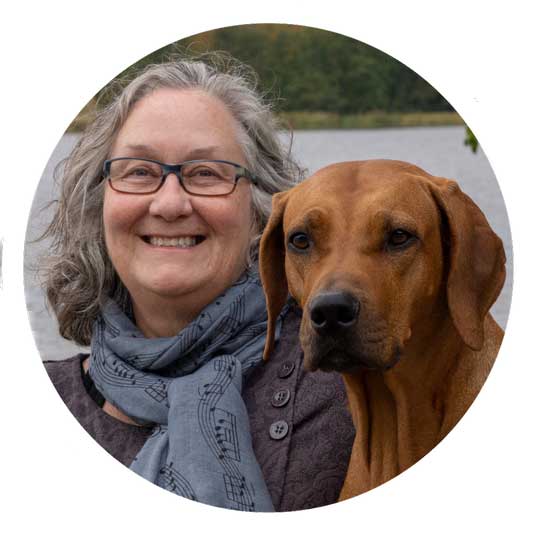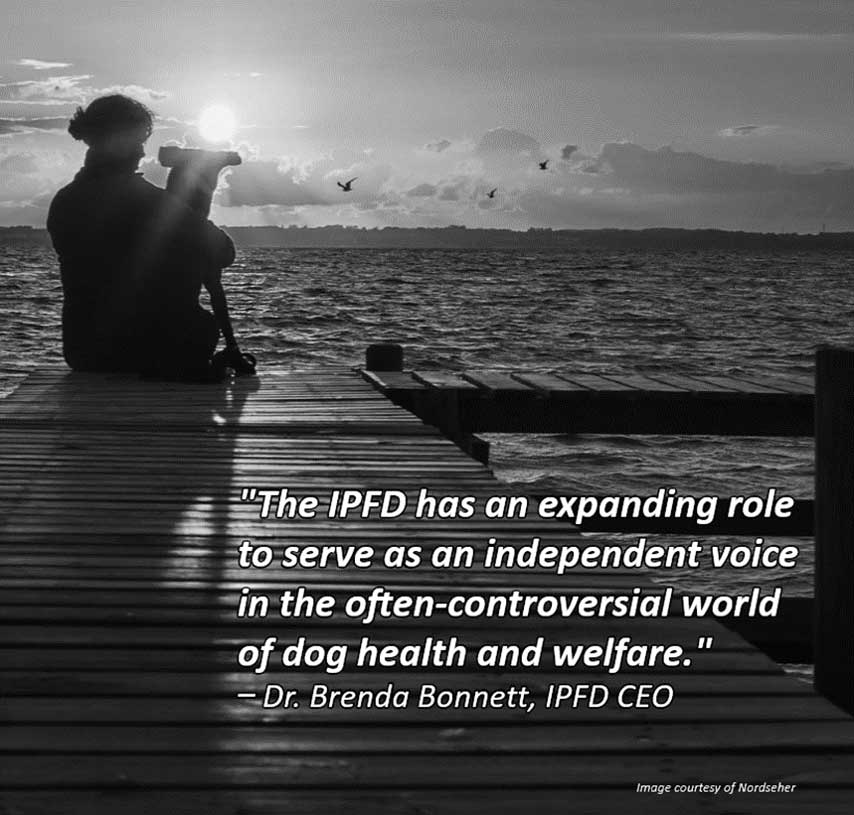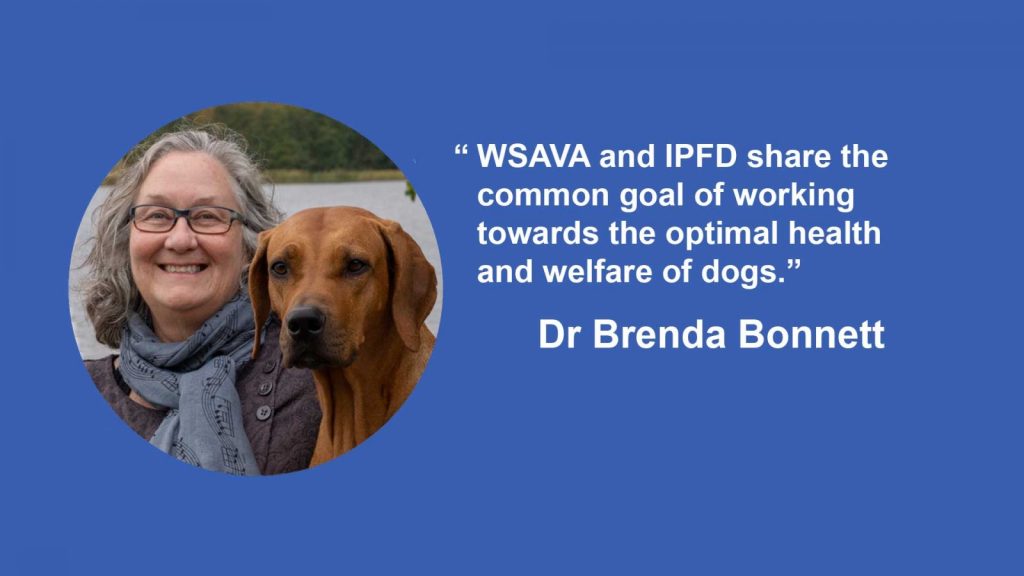Brenda N Bonnett BSc, DVM, PhD is CEO of our Educational Partner the International Partnership for Dogs (IPFD)

Dr Brenda Bonnett (photo courtesy of MånsEngelbrektsson)
Could you introduce yourself briefly to our members?
I qualified as a veterinarian in 1979 and, after spending time in practice, completed a PhD in Epidemiology at the University of Guelph in Canada. I served there until 2004 as Associate Professor in the Department of Population Medicine at the Ontario Veterinary College.
My research in Europe and North America has involved numerous species and disciplines and topics including theriogenology, breed-specific health risks, human-animal interactions and medical communication. I also speak around the world on these subjects.
Earlier this year, I was honored to receive an Honorary Doctorate from the Swedish University of Agricultural Sciences.
Could you introduce the International Partnership for Dogs (IPFD)?
The IPFD is a not-for-profit organization leading a global multi-stakeholder effort to enhance dog health, well-being and welfare and to support human-animal interactions. Our main platform is DogWellNet.com, a hub for information and resources. Our supporters and partners include national kennel clubs, international cynological organizations, groups with breed-specific interests, educational, professional and academic organizations and other stakeholders.
Our key goal is to build capability across the entire dog world – promoting the big picture of health and welfare and ‘connecting the dots’ to meet complex challenges.
What brought about your strong interest in dog health and healthy breeding?
In practice I worked with many dog breeders, as well as carrying out health management and reproductive work on horses and cattle. Following my PhD, I taught both veterinary and graduate students.
Breeding a litter of Rhodesian Ridgebacks in 1988 heightened my awareness of inherited disease in dogs and the challenges of breeding for health. I am ‘big picture’ person – always seeing the inter-relationships in complex issues of health and disease, the complicating aspects of both animals and people, and always looking for real-world, practical solutions.
While on sabbatical leave at the veterinary college in Uppsala, Sweden in 1994, I started to work with Agria insurance data and with the Swedish Kennel Club. These collaborations spawned work with PhD students and research on breed-specific risks in cats, horses, and dogs. Over the years, while giving presentations to breeders, veterinarians, and other groups, it became obvious that there was a need for international, multi-stakeholder collaboration to address health and welfare of dogs, and this eventually led to the creation of the IPFD.
The problems with brachycephalic dogs haven’t gone away of course – but do you think some progress has been made?
While health problems in brachys have been on veterinary radar since the late 60’s, back then these breeds were not common. In recent years, however, their popularity has rocketed. There is now increased awareness among pedigree breeders, many breed and kennel clubs are pursuing substantive programs and there is more research and multi-stakeholder collaboration. However, metrics for success are limited and change is not fast enough for some.
A major challenge has been an inability to substantively change consumer behaviour: while many groups have provided education about health and welfare problems, the popularity of these breeds continues to increase with the majority sourced from non-kennel/breed club associated breeders and many from puppy mills, etc. Heavy pressure has been put on kennel clubs to implement reforms but full resolution is beyond their influence and scope. Perhaps even the veterinary world, while raising awareness, has not taken substantive steps within its daily work to promote change. There is no simple solution to these complex problems and recent extreme regulatory approaches may not achieve widespread benefits for dogs.
What do you see as the next major health issues in dogs for veterinarians to be aware of?
Without behaviour change among consumers and stakeholders, efforts directed primarily at ‘breeding’ will continue to be of limited effectiveness. Commercial sources, even organized crime, is happy to support impulse buying, desire for trendy breeds, etc. This is not just about brachycephalics. Consider:
Sourcing – both legal and illegal trade: if owners could only acquire pets from high-quality sources, estimates across countries suggest that 75% or more of people wanting a puppy in any year would have to go without. Few in the pet industry are keen to see this happen. However, the definition and monitoring of sources, breeders and even rescues and shelters is extremely challenging.
Increased unilateral legislation is being enacted and may not be particularly effective. It may even have broad, unintended consequences.
Continued expansion in the world of genetics. Veterinarians need help in keeping abreast of developments and in assisting clients with the interpretation of direct to consumer testing.
Why did IPFD want to become an Educational Partner of the WSAVA?
WSAVA and IPFD share the common goal of working towards the optimal health and welfare of dogs. Canine health is a complex interplay between genetics (including breeding practices) and environmental factors, encompassing nutrition, lifestyle, preventative medicine, and appropriate healthcare. We are committed to working towards our common goal in a collaborative fashion by sharing of educational opportunities, expertise, and further resources.

The international veterinary community is a key stakeholder for IPFD. Reciprocally, the resources, information, programs and platforms being created by IPFD can assist WSAVA to pursue its mission for dogs, and help WSAVA members to understand broader issues of health and welfare, breeding, genetics, veterinary-client communication and so much more.
In other words – IPFD and WSAVA are a great team!
Tell us something about you that may surprise us!
My husband of almost 40 years was a professional musician and together, for a short while, we performed a children’s act called JimboJambo, in which I played various instruments, wrote, and sang songs, many about animals. We also did shows for the veterinary students when I was at Guelph. We ran a bed-and-breakfast for a friend, in Airey’s Inlet, Australia for nine months in 2002-3 while on a leave of absence from the university. We are still Aussie Rules Football fans.

